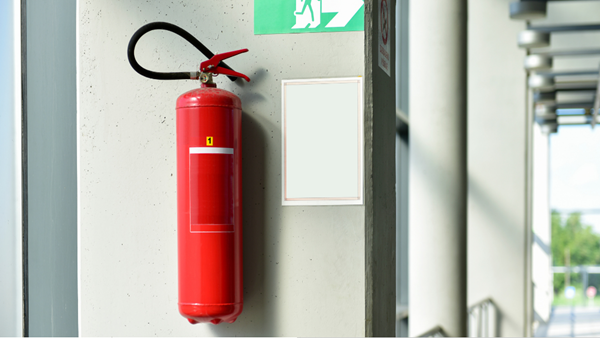Posted on
Your commercial building is probably equipped with fire extinguishers, illuminated exit lights, and a sprinkler system—but these alone are not enough to keep your staff and your customers safe in the event of a fire. An annual fire code inspection ensures that your business has the right safety equipment in place and is in compliance with the applicable fire code for commercial buildings. Learn more about why these inspections are necessary, and what to expect when the fire marshal shows up.
Who Needs a Fire Code Inspection, and How Often?
 The fire code for commercial buildings is far from uniform across the country. While many states have mandatory building codes, other states leave the adoption of building codes up to local jurisdictions. Therefore, which facilities are inspected, what a fire code inspection covers, and how frequently it will be performed all depend on where your business is located. Code standards may also differ based on your industry, building type, and capacity.
The fire code for commercial buildings is far from uniform across the country. While many states have mandatory building codes, other states leave the adoption of building codes up to local jurisdictions. Therefore, which facilities are inspected, what a fire code inspection covers, and how frequently it will be performed all depend on where your business is located. Code standards may also differ based on your industry, building type, and capacity.
In general, if you know that an inspection is required for your building, you should expect an unannounced visit from the fire marshall each year.
Why is Fire Protection in Commercial Buildings Important?
Most importantly, fire hazards at your business put the lives of staff and customers at risk. Non-compliance issues in the building can mean that a fire is more likely to start, can make it harder for first responders to reach you, and can prevent occupants from getting out in time.
A fire can also be devastating to your business. Consider this: if a fire swept through your facility, destroying the building as well as all property, paperwork, and inventory inside it, how long would it take you to reopen? Would you ever be able to reopen?
What Will the Fire Marshal Look for When Inspecting Your Building?
During your inspection, the fire marshal or inspector will look for potential fire risks, safety hazards, and other code violations that could cause the loss of life and property. They will also look for factors that could make fire spread more quickly within your building, and/or to other nearby buildings. The specific items they check will depend on local regulations, but may include those listed below.
- Is your company name and address clearly and visibly marked on the building’s exterior? (This helps first responders reach you quickly.)
- If there is a fire lane on your property, is it adequately marked and kept clear of all obstructions?
- If there is a fire hydrant on your property, is it free of vegetation overgrowth, snow, and other obstructions?
- Are there adequate ways to get out of the building, and are they accessible? In other words, occupants must be able to get out of the building quickly and easily in the event of a fire—without having to move stacks of boxes or struggle with a jammed door.
- Are all exits clearly marked with illuminated signs? Do the signs have any bulbs burnt out? Do the signs have a battery backup in case of a power failure?
- Is emergency lighting in place, and are any bulbs burnt out?
- Does heating equipment meet code requirements? There should be no open flames for heat in your facility, and space heaters are prohibited in some situations as well.
- Does electrical wiring meet code requirements? Cords should not be frayed, and electrical outlets should not be overloaded.
- Are fire extinguishers available? Are they the correct type needed for your facility? Are they placed correctly? Do they require service?
- Are your alarm and sprinkler systems functional? Has your sprinkler system been tested by a licensed service provider in the past year?
- Does your business have a written fire / disaster plan?
If any violations are found, the inspector will tell you how the issue can be corrected. Failure to bring the building up to code could mean expensive fines, and certain violations could result in your business being suspended or shut down.
However, there’s no need to wait for the fire marshal to mandate updates to your property—there are steps you can take today to keep your staff, customers, and inventory safer. Learn about the fire code for commercial businesses in your area, and perform regular self-checks to keep your property compliant. If you don’t have a commercial fire alarm system, it’s time to get one installed. Contact ISG today to learn more about our fire alarm systems, and get the best protection for your needs.
